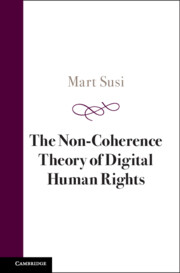Book contents
- The Non-coherence Theory of Digital Human Rights
- The Non-coherence Theory of Digital Human Rights
- Copyright page
- Contents
- Acknowledgements
- Introduction
- Part I The Contextual Challenges and Purpose of the Non-coherence Theory of Digital Human Rights
- Part II Reflections on Some Theories and Doctrines
- Part III The Core Elements of Non-coherence Theory
- Part IV The Impact of the Non-coherence Theory
- Part V Internet Balancing Formula
- 21 The Internet Balancing Formula
- 22 Robert Alexy’s Views on the Internet Balancing Formula
- 23 Reply to Alexy Critique
- 24 The Debate
- In Lieu of the Concluding Remarks
- Index
22 - Robert Alexy’s Views on the Internet Balancing Formula
from Part V - Internet Balancing Formula
Published online by Cambridge University Press: 22 February 2024
- The Non-coherence Theory of Digital Human Rights
- The Non-coherence Theory of Digital Human Rights
- Copyright page
- Contents
- Acknowledgements
- Introduction
- Part I The Contextual Challenges and Purpose of the Non-coherence Theory of Digital Human Rights
- Part II Reflections on Some Theories and Doctrines
- Part III The Core Elements of Non-coherence Theory
- Part IV The Impact of the Non-coherence Theory
- Part V Internet Balancing Formula
- 21 The Internet Balancing Formula
- 22 Robert Alexy’s Views on the Internet Balancing Formula
- 23 Reply to Alexy Critique
- 24 The Debate
- In Lieu of the Concluding Remarks
- Index
Summary
Mart Susi’s Internet Balancing Formula is completely different from the Weight Formula. It is not general but highly particular, and it is not abstract but highly concrete. And it must be particular and concrete. In offline balancing the substantive dimension can and must be delegated to argumentation. Here the Weight Formula is a form of legal argumentation. In contrast to this, rational online balancing is only possible on the basis of a solid substantive input. Precisely this Susi attempts to provide with his Internet Balancing Formula. The main critiques are related to the elements of internet vulnerability and the element of empathy.
Keywords
- Type
- Chapter
- Information
- The Non-Coherence Theory of Digital Human Rights , pp. 267 - 277Publisher: Cambridge University PressPrint publication year: 2024

